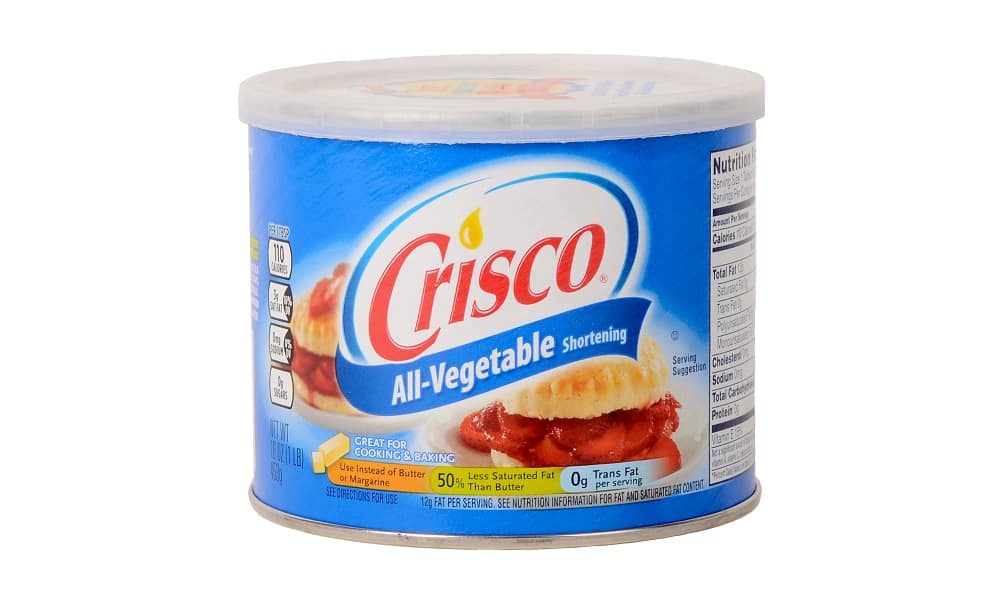Crisco is a brand of shortening produced by B&G Foods, the same company that owns other food brands such as Cream of Wheat, Molly McButter, Mrs. Dash, and so on. As a popular brand of shortening, Crisco is commonly used for baking as it gives the baked goods and pastries a crumbly and flaky texture. Other people also use Crisco to fry food instead of using cooking oil. Since Crisco is a typically common product used in baking and cooking, it is important to determine if Crisco is vegan or not.
Although shortening is commonly considered a gray area ingredient, it is probably safe to assume that the all-vegetable shortening Crisco is vegan. Shortening can be made from animal fats, but Crisco is primarily made from hydrogenated vegetable oils such as palm oil and soybean oil. Other vegans might worry about Crisco since it contains glycerides, another commonly considered gray area ingredient. However, if Crisco is truly all-vegetable, then the glycerides used in Crisco must be plant-derived as well.
Table of Contents
Is Crisco Vegan?

Crisco is a popular brand of shortening in the US and is commonly used in baking to produce baked goods and pastries with a certain texture that shortening allows. Without shortening, the gluten in the flour stretches and makes the resulting baked good chewy like bread. However, shortening inhibits the stretching of these gluten strands which allow the baked good to be flaky instead.
Since the list of ingredients of Crisco shortening does not contain any obvious animal product or derivative, it can be considered by many to be vegan. At the very least, Crisco shortening is surely more vegan than other shortening products that would use actual animal fats such as lard or tallow.
One point of concern for some vegans may be the inclusion of glycerides. Glycerides are typically added to some shortening products to act as an emulsifier that would help the shortened dough mix with water more effectively. Vegans are wary of glycerides because glycerides can be commercially produced using either animal or plant substances.
However, if Crisco is truly “all-vegetable” as it claims, then the glycerides used in Crisco are probably plant-based as well. This would mean Crisco is completely vegan. Crisco is even commonly used in vegan baking as a substitute for butter.
Crisco Ingredients List
The list of ingredients of Crisco All-Vegetable Shortening includes (1): soybean oil, fully hydrogenated palm oil, palm oil, mono and diglycerides, TBHQ and citric acid (antioxidants).
While Crisco is predominantly associated with shortening, the brand has also expanded to other products such as cooking oil, cooking spray, and coconut oil (2). However, this article will focus on the shortening product of the brand.
Aside from the ingredients listed, Crisco lists that the shortening product contains 0 g of trans fat per serving. However, this does not necessarily mean that Crisco does not contain any trans fat because the FDA allows food manufacturers to declare their products having 0 g of trans fat per serving if the amount of trans fat in a single serving is less than 0.5 g.
It also contains 50% less saturated fat compared to butter. While a tablespoon of butter would contain about 7 g of saturated fat, the same amount of Crisco shortening would only contain about 3.5 g.
Crisco shortening also serves as an excellent source of ALA (alpha-linolenic acid) omega-3 fatty acid, a polyunsaturated fatty acid that has been studied to confer an abundance of health benefits such as reduction in cardiovascular diseases, reduction in inflammatory diseases, promotion of brain development and function, and aid in mental health (3).
Glycerides
Glycerides are common food additives found in many products. Typically existing as mono- or diglycerides, these substances are often used as emulsifiers in food to allow ingredients of different polarities to mix effectively. Common ingredients that would require emulsifiers would be water and oil as the two would not normally mix without the help of emulsifiers.
Structurally, glycerides are composed of glycerol and fatty acids. The conventional nomenclature used like mono-, di-, and triglycerides simply refers to the number of fatty acids esterified to the glycerol.
The issue with glycerides is that they are typically considered gray area ingredients within the vegan community. Vegans need to know if whether the food they are eating is vegan or not. Unfortunately, there are some substances that are relatively difficult to ascertain compared to others – these are gray area ingredients.
The problem with glycerides is that the name used in the packaging does not effectively inform the consumers where the companies obtain their glycerides since glycerides are commercially made by combining glycerol and fatty acids – components that can be obtained from both plant and animal sources. Thus, glycerides can either be vegan or not without any additional information.
In Crisco, it would seem logical to assume that the glycerides used are plant-derived since Crisco is said to be “all-vegetable.” However, vegans would be more comfortable if the company can say it outright just like how they declare that Crisco is gluten-free and kosher.
References
3. https://onlinelibrary.wiley.com/
Featured Image Credit: dcwcreations / Depositphotos.com




